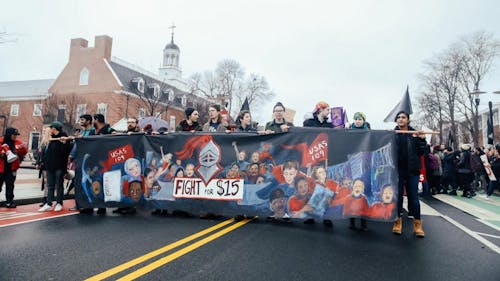Students protest throughout New Brunswick in fight for $15 minimum wages at Rutgers

The chants of student protesters echoed down College Avenue, throughout Downtown New Brunswick and in front of Old Queens — the location of University President Robert L. Barchi’s office — in a fight for higher minimum wages.
Earlier today, Rutgers United Students Against Sweatshops (USAS) alongside a consortium of activist groups on campus took Brower Commons' steps in an organized protest that demanded Rutgers raise its minimum wage to $15 — what they consider a living wage.
"Bargaining for the Common Good is having a conference, in conjunction with the National USAS conference — United Students Against Sweatshops Conference — and we are coming together to fight for a living wage at Rutgers campus. We have unions from all across the country, we have local USAS chapters all around the country coming here to support a living wage on campus and for fair contracts," said Christian Berk, a graduate student in the School of Management and Labor Relations.
USAS did not stand alone at the rally. It was supported by other organizations on campus such as the American Association of University Professors (AAUP), the American Federation of Teachers (AFT) and the Democratic Socialists of America.
Protesters met at Brower steps on College Avenue and made their way toward the New Brunswick Amtrak before taking a left onto the intersection between George Street and Albany Street. They stood there briefly before continuing their march underneath the scarlet-red overpass up the hill at Old Queens.
In December, members of USAS entered Trayes Hall, bypassed a line of police officers and interrupted a Board of Trustees meeting, chanting, “We work, we sweat, put that 15 on our set.”
On Monday, The Daily Targum reported that 12 of those students are now facing police charges for disorderly offenses.
"We see this as a sign of the University trying to intimidate the movement for a living wage on campus, and we confronted the Board of Trustees because those people, as well as President Barchi, are the people who make the fiscal decisions for this University and we decided that it was time and it was necessary to take our demands to those who can actually implement the change that we need. And this comes after more than a year of going through every kind of available formal and regular process — writing letters, doing petitions," Berk said.
Despite this, USAS still has its eye on the prize, Berk said. They will not stop until the University meets a $15 minimum wage, as many of the students in the organization cannot afford it to be any other way.
"Anything less than $15 is poverty wages," he said.
Barchi announced, on the day of last semester's board meeting, that worker minimum wages at Rutgers would increase to $11 an hour — a 30-percent increase, according to the Targum.
"We see that as a significant victory on our part, that we're being heard and that the administration is finally listening to students who are suffering and again we truly appreciate making $11 an hour," Berk said.
Mathew Widzins, an organizer of the rally and a School of Arts and Sciences senior, said that the organization is conscious of what risks it put those 12 students in, but that backing down because of the incident would hinder its progress.
“There’s like $804 million in unrestricted funds right now, that’s according to David Hughes, who’s the head of AAUP. Rutgers consistently runs budget surpluses in its years, they just don’t call it surpluses because it’s a public institution so they can’t run for profit technically,” Widzins said.
In a statement to the Targum, Barchi said that the University has done all it can after having raised the minimum wage to $11 in January.
Dory Devlin, a University spokesperson, said, “Access and affordability for all students is a top priority at Rutgers University ... The University will continue to work to keep tuition increases at a minimum while seeking new ways to support students as they pursue their degrees.”
The raise to $11 was the first time that the University passed the state minimum wage. Although the state currently holds wages at $8.60 an hour, the Garden State’s new governor, Phil Murphy (D-N.J.), has consistently shown intentions to raise that to $15. Devlin said that if Murphy’s initiatives become law, Rutgers will follow suit.
“Governor Murphy has committed to increasing the minimum wage in New Jersey to $15 per hour over the course of the next few years. The University will be following legislative action regarding this initiative and will abide by any changes made to state-wage laws,” Devlin said.
Mariah Wood, an organizer for USAS, said there was some fear heading into today’s protest following the earlier charges, but that the group is not willing to back down. The reality that people are hungry and people cannot pay their rent is what inspires the organization to continue fighting its campaign, she said.
“This was real and this was a movement moment," the School of Arts and Sciences senior said. “This was us taking back our streets and showing that we aren’t going to back down even in light of these heinous charges that have been pressed against 12 student leaders.”



